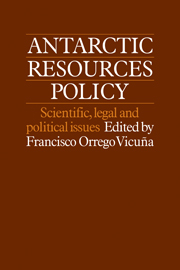Book contents
- Frontmatter
- Contents
- List of contributors
- 1 Antarctic resources policy: an introduction
- Part one The state of Antarctic knowledge and experience
- Part two The policy for the conservation of the living resources of Antarctica
- Part three The policy for the exploration and exploitation of the mineral resources of Antarctica
- Part four Issues on Antarctica and the law of the sea
- Part five The policy for Antarctic cooperation
- 20 Antarctica's role in international relations
- 21 Alternatives for cooperation and institutionalization in Antarctica: outlook for the 1990s
- 22 Resource development in polar regions: comments on technology
23 - Jurisdictional problems in relation to Antarctic mineral resources in political perspective
Published online by Cambridge University Press: 06 July 2010
- Frontmatter
- Contents
- List of contributors
- 1 Antarctic resources policy: an introduction
- Part one The state of Antarctic knowledge and experience
- Part two The policy for the conservation of the living resources of Antarctica
- Part three The policy for the exploration and exploitation of the mineral resources of Antarctica
- Part four Issues on Antarctica and the law of the sea
- Part five The policy for Antarctic cooperation
- 20 Antarctica's role in international relations
- 21 Alternatives for cooperation and institutionalization in Antarctica: outlook for the 1990s
- 22 Resource development in polar regions: comments on technology
Summary
The growing pressure on the Antarctic System
In Antarctica, territorial claims have been made by some states and are rejected by others. As long as an agreed minerals regime has not been established and approved by both groups, mineral exploitation in claimed territory can be carried out only by permission from the claimant state or in defiance of its claimed authority. Acceptance without protest of unilateral authorization from the claimant state will be tantamount to recognition of the claim. Consequently, states that do not recognize the claim will be forced to react or they must acknowledge that the sovereignty issue is being settled contrary to their wishes. On the other hand, if exploitation is carried on without the approval of the claimant state, it will be forced to interfere or it will find that its failure to react will be regarded as yielding the claim and, in effect, as an indirect recognition of effective occupation of the area by another party. Thus, unless agreement is reached between the parties to allow and ensure exploration and eventual exploitation of mineral resources to proceed in Antarctica in orderly fashion, the conduct of such operations is bound to upset the established balance in the Antarctic Treaty System and to destroy relations between the parties.
Under the terms of the consultative procedure that has been established under the Antarctic Treaty, the Consultative Parties may consider and adopt ‘measures regarding … preservation and conservation of living resources in Antarctica’.
- Type
- Chapter
- Information
- Antarctic Resources PolicyScientific, Legal and Political Issues, pp. 317 - 335Publisher: Cambridge University PressPrint publication year: 1983
- 1
- Cited by



